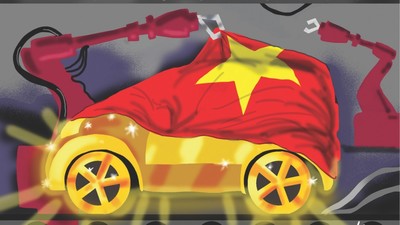FLASH BACK: Unfolding American Automotive Landscape - The United States of China
By Martha Hindes
Senior Editor
Michigan Bureau
THE AUTO CHANNEL
DETROIT - February 2, 2017: "The Chinese never give up." That statement, reiterated by Michael J. Dunne has a ton of implications for Americans. Dunne, speaking before the Automotive Press Association in Detroit Thursday was predicting how the Chinese will impact the future of the auto industry in the United States, once the pinnacle of the automotive world.
Dunne, a native Detroiter, founded his Hong Kong-based firm, Dunne Automotive, a quarter century ago to identify promising areas of investment in the world's most populous nation and subsequently largest auto market. That's a move that has helped take American and other international auto companies to China and brought increasing Chinese corporate ownership to the U.S.
"It isn't a matter of whether or when," Dunne added. "The Chinese are here now."
What had started as a small venture into the Chinese car market in the early '80s, led heavily by then General Motors Corp., has become a Chinese landscape populated by international automotive names that actually, by Chinese law, are all 50-50 partnerships.
"It was a trade-off for any company going in there for market access. What do we have to pay to get in there and sell our cars?" And it's fueled by the nature of competition. "You guys went in, so we've got to go in. I can't be the one to not go in.The Chinese played that very cleverly," he said.
For anyone buying cheap Chinese goods at Walmart or other discounters at the beginning of the run some 35 years ago, those savings for goods made by then cheap Chinese laborers helped fuel an unimaginable explosion of growth in China and helped it accumulate vast wealth. Those dollars from discounted goods now are part of the money coming back to buy up sometimes ailing or near-death American companies.
Struggling American auto suppliers became an opportunity the Chinese couldn't ignore and they continue to invest in or own once-familiar corporate names both here and abroad. Among familiar names now Chinese owned or controlled are Henniges Automotive, Volvo Auto in Sweden, owned briefly by Ford and now owned by China's Geely, with MIchigan's A123 Systems' low voltage battery supplier to soon join the club.
That, according to Dunne, is a trend that will continue rather than abate and more of the American landscape will be populated by Chinese interests, especially suppliers and high tech interests relating to electrified vehicles. Those are critical to the Chinese said Dunne.
Because of their dependence on coal for much of their power production that causes massive amounts of air pollution throughout the country, going world class electric and autonomous is seen as a way of controlling it. And, said Dunne, the Chinese, already a top global user of petroleum, do not want to become any more dependent on foreign oil that has hampered the United States.
Don't expect a flood of cheap Chinese autos to flood the American market, at least not yet. In their quest for electrification, they are going high scale. An example is the just revealed Faraday Future's 1,050 horsepower FF91 electric supercar, backed by China's LeEco, that can learn its owner's driving preferences.
And, already in their move to grow into the dominant player in the global auto industry, Chinese-built autos with American names are being imported into the U.S., including the new, distinctly American-looking Buick Envision, manufactured in China and imported to the U.S.
The Chinese people love American and foreign named vehicles, a reason the Chinese American partnerships manufacturing in China don't bear Chinese names. Ford Motor's Lincoln luxury brand is an example, according to Dunne. The Chinese know the Lincoln name "from President Lincoln." And Lincoln dealerships in China -- unparalleled in luxury and service -- have built momentum in only a couple of years, now selling about 30,000 Lincoln badged vehicles there a year.
But strict Chinese trade restrictions have kept any foreign vehicles shipped to China in single digit territory, currently around 4 percent. Hefty export duties on American vehicles, now at 25 percent, have ensured that few American-built cars will get into China.
"Hey, from their perspective," said Dunne, " ' you guys got access and you made a lot of money and your cars are on our roads.' "
A comment overheard: Will our new President Trump be satisfied only with having more American jobs at home? Or, as some hope, will he mandate that ownership remain American.
Copyright, Martha Hindes, Automotive Bureau, all rights reserved.



